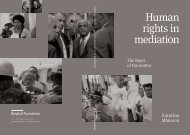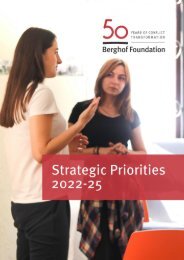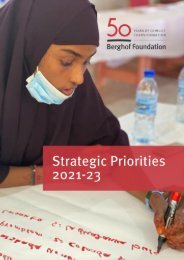Berghof Foundation: 50 years of conflict transformation
This book provides an overview of the Berghof Foundation’s work and impact over the past 50 years and sheds light on the challenges ahead of peacebuilding.
This book provides an overview of the Berghof Foundation’s work and impact over the past 50 years and sheds light on the challenges ahead of peacebuilding.
You also want an ePaper? Increase the reach of your titles
YUMPU automatically turns print PDFs into web optimized ePapers that Google loves.
Yemen<br />
2012–present<br />
How to<br />
engage<br />
with all<br />
parties in<br />
times <strong>of</strong><br />
war?<br />
Yemen has a long history <strong>of</strong> <strong>conflict</strong>. In 2012,<br />
the country embarked on an ambitious political<br />
transition process that was meant to lead to a<br />
federal, democratic state. The <strong>Bergh<strong>of</strong></strong> <strong>Foundation</strong><br />
and its Yemeni partner organisation PDF (Political<br />
Development Forum) started providing process<br />
support to the Yemeni National Dialogue Conference<br />
(NDC) and <strong>of</strong>fered opportunities for consensusbuilding.<br />
When disagreements and mistrust between<br />
the parties quickly grew during the implementation<br />
process following the NDC, the Yemeni parties<br />
resorted to violence and the transition process<br />
faltered in 2014. Ultimately, Ansar Allah/the Houthis<br />
and their allies (among them the former long-time<br />
president Ali Abdallah Saleh) took the capital Sana’a<br />
by force. President Hadi and his government had to<br />
relocate to Aden, in the south <strong>of</strong> Yemen, and Riyadh,<br />
Saudi Arabia. In March 2015, Saudi Arabia and the<br />
United Arab Emirates, together with a number <strong>of</strong><br />
supporting countries, entered the war.<br />
Since then the country has been trapped<br />
in a cycle <strong>of</strong> violence, with no single actor being<br />
able to dominate militarily or take control <strong>of</strong> the<br />
whole country. Yemen has become increasingly<br />
fragmented: politically, territorially and socially.<br />
For <strong>Bergh<strong>of</strong></strong> and PDF, a new question arose: how<br />
to support efforts for a political solution when the<br />
warring parties refuse to acknowledge each other<br />
and view any effort to engage with the other side as a<br />
hostile act?<br />
As <strong>Bergh<strong>of</strong></strong> and PDF had gained a high level<br />
<strong>of</strong> trust among Yemeni political elites during the<br />
NDC, we were able to establish inclusive national<br />
fora for political dialogue in 2015. Representation<br />
was based on consensual criteria as defined by the<br />
NDC, meetings took (and still take) place monthly<br />
in Sana’a, Taiz, and later in Aden. In addition, we<br />
facilitated inclusive dialogue meetings in other<br />
countries in the Middle East and Germany to ensure<br />
that representatives <strong>of</strong> all parties could participate.<br />
The meetings covered all aspects <strong>of</strong> the <strong>conflict</strong>:<br />
the political and security/military dimensions,<br />
a roadmap for continuing the political dialogue and<br />
completing the political transition process, options<br />
for state formation and the status <strong>of</strong> the South.<br />
We also convened dialogue sessions on the<br />
economic and financial dimensions <strong>of</strong> the war and<br />
on options to restart the political process.<br />
Building on the long-established relations<br />
<strong>of</strong> trust and the fact that we did not take substantive<br />
positions but provided opportunities for dialogue,<br />
the parties came to view the meetings as useful<br />
and requested continuous support. We spent a lot<br />
<strong>of</strong> time on preparations, making sure to choose<br />
relevant topics, the right format and appropriate<br />
level <strong>of</strong> participation. Our partnership with PDF, with<br />
their in-depth contextual knowledge and excellent<br />
relations with political actors across the spectrum,<br />
was one <strong>of</strong> the key factors that helped keep the<br />
meetings relevant, trusted and useful.<br />
The meetings were closely coordinated<br />
with the UN Special Envoy and his team and with<br />
the German Federal Foreign Office, our main donor<br />
and partner. The meetings produced a number <strong>of</strong><br />
tangible outcomes: they helped parties generate<br />
new ideas and contributed to building consensus<br />
on topics and structures for the peace process.<br />
Ahead <strong>of</strong> the peace negotiations in Kuwait in 2016,<br />
for instance, some <strong>of</strong> the questions relating to the<br />
formula and sequencing <strong>of</strong> the negotiations were<br />
discussed in our consultations with Yemeni parties<br />
and some specific ideas on consensual mechanisms<br />
were initially formulated in our meetings. Starting<br />
in 2018, discussions and preparations <strong>of</strong> formal<br />
talks focused on how to revitalise the Yemeni state<br />
and on the crucial role <strong>of</strong> local authorities. At a local<br />
level, the dialogues were temporarily successful in<br />
easing tension and secured, for example, a prisoner<br />
exchange in Taiz. In addition, we complemented<br />
political discussions with on-the-ground support to<br />
strengthen inclusive local governance in a number<br />
<strong>of</strong> governorates and enhance community safety<br />
initiatives in several cities.<br />
Today, we have hope for new diplomatic<br />
initiatives. For this purpose, in 2020 we started<br />
involving Yemen’s regional neighbours in discussions<br />
about options for Yemen’s future and regional ‘red<br />
lines’. As the new US administration has promised<br />
to re-engage in the Gulf and support ending the<br />
war in Yemen, there is reason to believe that a fresh<br />
diplomatic initiative based on a new regional and<br />
international understanding would provide a strong<br />
incentive for the Yemeni actors to come together and<br />
revitalise efforts for a Yemeni-led political solution.<br />
<strong>Bergh<strong>of</strong></strong> and its partner PDF are well-placed and<br />
ready to continue supporting them.<br />
Lorem ipsum dolor sit amet nur consequitam dolor habitam. Photo: Jane Donough / UNHCR<br />
72










